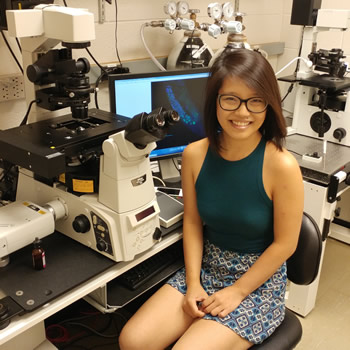By Corbin Black
 Dr. Monica Wu is a Research Scientist at New England Biolabs in Boston, Massachusetts. She earned a B.Sc. in Biochemistry from Western University (London, Canada), and then received her Ph.D. last year from the University of Toronto, where she trained with Dr. Julie Claycomb. One unusual aspect of her career path is that she was able to get a scientist position in a biotechnology company without first completing a post-doctoral fellowship. “This required a bit of luck,” she said. “If you are interested in a research position in industry, try to focus your search on positions that are tailored to your skillsets. I also found it particularly useful to find a company that aligns with your personal values and goals. I was particularly drawn to New England Biolabs’ emphasis on basic research and that shared value provided a strong foundation throughout the interview process.” Dr. Wu’s current focus is “engineering enzymes and toolkits for the rapid, large-scale synthesis of RNA that can be used in vitro and in vivo. In addition to their use as tools for the biochemical understanding of physiological processes, synthetic RNAs are being used in biopharmaceuticals, including RNA-based therapeutics, vaccines and diagnostics.”
Dr. Monica Wu is a Research Scientist at New England Biolabs in Boston, Massachusetts. She earned a B.Sc. in Biochemistry from Western University (London, Canada), and then received her Ph.D. last year from the University of Toronto, where she trained with Dr. Julie Claycomb. One unusual aspect of her career path is that she was able to get a scientist position in a biotechnology company without first completing a post-doctoral fellowship. “This required a bit of luck,” she said. “If you are interested in a research position in industry, try to focus your search on positions that are tailored to your skillsets. I also found it particularly useful to find a company that aligns with your personal values and goals. I was particularly drawn to New England Biolabs’ emphasis on basic research and that shared value provided a strong foundation throughout the interview process.” Dr. Wu’s current focus is “engineering enzymes and toolkits for the rapid, large-scale synthesis of RNA that can be used in vitro and in vivo. In addition to their use as tools for the biochemical understanding of physiological processes, synthetic RNAs are being used in biopharmaceuticals, including RNA-based therapeutics, vaccines and diagnostics.”
For Dr. Wu, “perseverance has been one of the most important traits for my success.” She explained, “A Ph.D. is full of challenges and pitfalls. Everyone in their career, at some point, will come upon a wall. Setbacks and failures are part of the job, and you need to be able to take them in stride.” Another key aspect for success is great mentorship. “Having a successful career in science can be hard, but I think it can be difficult for women who are trying to balance both their career and family responsibilities. I was very fortunate to have been surrounded by a lot of inspiring women throughout my career who taught me that it is possible to ‘have it all’. I really have to thank Dr. Julie Claycomb, Dr. Leah Cowen, and my current supervisor and group leader, Dr. Bijoyita Roy, for all of their encouragements.” Dr. Wu also sees mentors as critical for increasing diversity in STEM. “Mentors should encourage trainees to ask questions and present their work as often as possible,” she explained. “For those in leadership positions, it will go a long way to sponsor young scientists and provide them with equal opportunities. Having role models who use their influence to advocate for their fellow colleagues is absolutely critical for driving change.”
“Setbacks and failures are part of the job, and you need to be able to take it in stride”
The role of mentorship, and promoting minority representation in STEM, is an area in which Dr. Wu is especially passionate. “It is important to first acknowledge that, while we have made great strides, there is still a lack of diversity in STEM,” she said. “From my own experience, it can be a challenge to establish oneself in a new workplace, so working to build self-confidence in trainees is really important.” On a personal level, overcoming imposter syndrome and building self-confidence meant “I had to stop comparing myself to others and just focus on doing the best job that I could.”
For trainees, Dr. Wu had two other pieces of advice for success. “I am a strong advocate for scientists, especially trainees, to get off the bench and try something new. You gain additional skill sets, differentiate yourself from the crowd, and it is really helpful for keeping perspective.” For example, during Dr. Wu’s graduate studies, she participated in student leadership groups and organized meetings and conferences, such as Toronto RNA Enthusiasts’ Day (TREnD) and Toronto Area Worm Meetings. Dr. Wu also emphasized the importance of attending conferences. She explained, “conferences aren’t just for learning about exciting new research, but are also invaluable for meeting as many people as possible. Expanding your network is instrumental when you start to apply for jobs—not only for providing character references, but also to get exposure to all the different types of positions that are out there. There is more than just research and development (‘R&D’) positions and, if you are interested in transitioning to industry, I highly recommend you approach an industry representative the next time you are at a conference and start a conversation about their research and job. We’re always happy to talk!”
Dr. Wu’s favorite RNAs are lin-4 and let-7 microRNAs, because they were the first microRNAs to be discovered and it was in C. elegans (“the best model organism ever”)! You can find her on Twitter @monicazwu or connect with her on LinkedIn.
